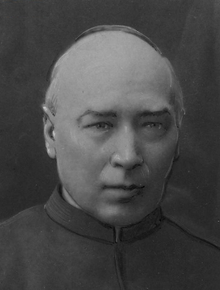Stefan Zachariasz Pawlicki
Stefan Zachariasz Pawlicki CR (born September 2, 1839 in Gdańsk , † April 28, 1916 in Kraków ) was a Catholic priest , professor , philosopher and historian of philosophy , rector of the Jagiellonian University and precursor of scientific apologetics in Poland .
Life
He came from a family of merchants. At first he was brought up in Gdansk, later the family moved to Pleszew . At the age of 13, he lost his parents in an epidemic. He graduated from Plesze High School with the help of the local pastor, Father Basińskiego. He then attended the royal Catholic college in Ostrow between 1853 and 1858 thanks to a scholarship he received from Johann von Dzialynski . He passed his matriculation examination in 1858 and was passed away as one of the best students of the cavity. During the distribution of the certificates, he gave a speech De vita et scriptis Sarbievii Poloni .
From 1858 to 1862 he studied classical philology at the University of Breslau . In Wroclaw he was secretary and president of the Society of Literature and Slavic Languages . In 1862 he left Breslau without a degree. Between 1862 and 1864 he was Edward Aleksander Raczyński's tutor in Rogalin . From 1864 he studied at the Philosophical Faculty at the University of Wrocław. At the same time he attended lectures on psychology and logic . In 1865 he submitted his dissertation De doctrina et philosophandi Schopenhaueri ratione - a groundbreaking treatise on the spirit of Arthur Schopenhauer .
In 1866 he gave lectures in the Szkoła Eleatów and Szkole Głównej in Warsaw . He taught there until 1868 at the Faculty of Philology and History of Philosophy. In 1868 he became a member of the editorial board of Biblioteki Warszawskiej , a magazine that published theatrical and literary reviews. In Warsaw, under the influence of the founder and superior general of the Resurrectionists, Piotr Semenenko , he made a spiritual breakthrough. In 1868 he went to Rome and entered the novitiate of the Resurrectionists. In 1872 he received in the Lateran Basilica , the ordination .
In 1869 he began to study Christian philosophy and theology at the Collegium Romanum of the Jesuits . In 1873 he received his doctorate in theology on the mystery of the Holy Trinity . In the same year he became Vice-Rector of the Pontifical Polish College in Rome. In 1887 he tried to get the chair of philosophy at the Jagiellonian University in Krakow. His efforts failed, he stayed in Rome and became a professor at the Pope Pius IX. established Religione Accademia di Cattolica .
In 1882 he received a professorship in the Faculty of Theology at the University of Krakow. About his transfer, Leo XIII said . : Magnum Lumen Mitto Vobis (I will send you a great light). In the consistory of November 10, 1884, the Pope wanted to elevate him to cardinal , but he refused this honor. In 1884 he was promoted to a corresponding member of the Faculty of History and Philosophy of the Academy of Sciences and in 1891 to an active member. From 1888 to 1889 and 1892 to 1893 he was Dean of the Faculty of Theology at the University of Cracow. In 1894 he moved to the Philosophical Faculty of the Jagiellonian University. In the academic year 1905/1906 he was rector of the same university. He retired in 1910 after a lecture at the university as professor emeritus .
Because of his humor, he was well received by the students. He was considered a professor of great knowledge, great learning and extraordinary skills: at the University of Krakow he is legendary to this day.
After his retirement he taught philosophy at the Adrian Baraniecki Higher School for Women . From 1911 on he was chairman of the Committee on the History of Polish Philosophy. He was a member of the Philosophical Society in Cracow and the Polish Philosophical Society in Lviv . He was also a member of a number of Italian and German scientific societies. He participated and lectured in conferences of philosophers.
After his death he was buried in the Rakowicki Cemetery in Kraków. He left his rich collection of books to the Jagiellonian Library . One street in Krakow honors his name.
Works
- Historia filozofii greckiej od Talesa do śmierci Arystotelesa , B. I 1890, B. II 1903, unfinished
- Wiktor Cousin , 1867
- O początkach chrześcijaństwa , 1884
- Pozytywizm ( Studia nad pozytywizmem ), 1886
- Renan , 1896
- Filozofia Fouillé'go , 1899
- Materializm ( Materializm wobec nauki ), 1870
- Darwinizm , 1876
- Mózg i dusza , 1874
- Kilka uwag o podstawach i granicach filozofii , 1878
- Lassale i przyszłość socjalizmu
- Żywot i dzieła Ernesta Renana
literature
- Stefan Pawlicki , Wielka Ilustrowana Encyklopedia Powszechna , Volume XII, Kraków , 1932; Reprint, Kraków, 1995.
- Jarosław Biernaczyk , Stefan Pawlicki , Alma Mater Ostroviensis - Księga Pamięci - Non Omnis Moriar , Volume X, Ostrów Wielkopolski , 2003.
- Władysław Tatarkiewicz , Historia filozofii , 3 volumes, Warsaw, Wydawnictwo Naukowe PWN , 1978.
Web links
- Stefan Zachariasz Pawlicki. In: Salvador Miranda : The Cardinals of the Holy Roman Church. ( Florida International University website, English)
| personal data | |
|---|---|
| SURNAME | Pawlicki, Stefan Zachariasz |
| ALTERNATIVE NAMES | Pawlicki, Stefan |
| BRIEF DESCRIPTION | Catholic priest, professor, philosopher and historian of philosophy, rector of the Jagiellonian University and precursor of scientific apologetics in Poland |
| DATE OF BIRTH | September 2, 1839 |
| PLACE OF BIRTH | Gdańsk |
| DATE OF DEATH | April 28, 1916 |
| Place of death | Kraków |
